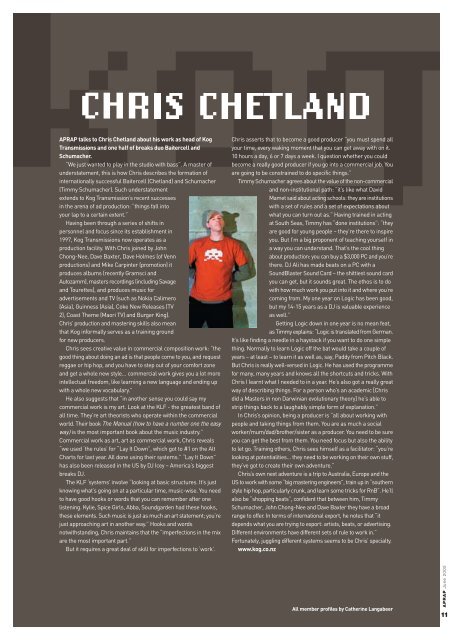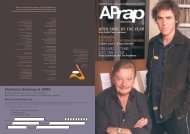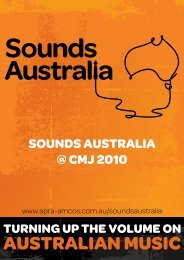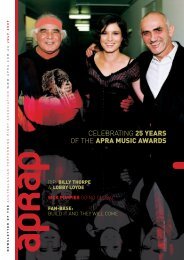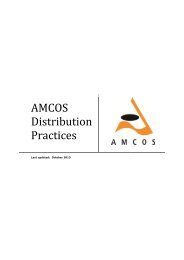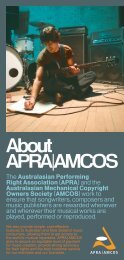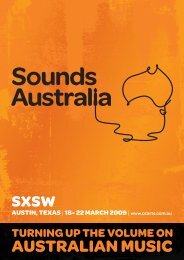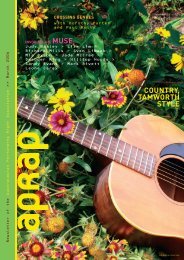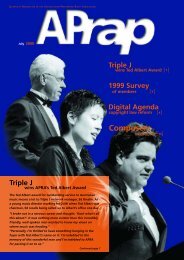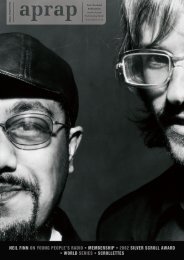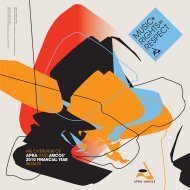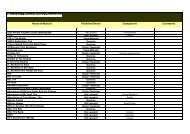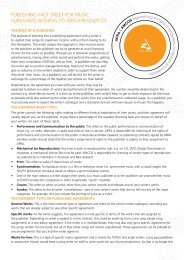You also want an ePaper? Increase the reach of your titles
YUMPU automatically turns print PDFs into web optimized ePapers that Google loves.
<strong>APRAP</strong> talks to Chris Chetland about his work as head of Kog<br />
Transmissions and one half of breaks duo Baitercell and<br />
Schumacher.<br />
“We just wanted to play in the studio with bass”. A master of<br />
understatement, this is how Chris describes the formation of<br />
internationally successful Baitercell (Chetland) and Schumacher<br />
(Timmy Schumacher). Such understatement<br />
extends to Kog Transmission’s recent successes<br />
in the arena of ad production: “things fall into<br />
your lap to a certain extent.”<br />
Having been through a series of shifts in<br />
personnel and focus since its establishment in<br />
1997, Kog Transmissions now operates as a<br />
production facility. With Chris joined by John<br />
Chong-Nee, Dave Baxter, Dave Holmes (of Venn<br />
productions) and Mike Carpinter (promotion) it<br />
produces albums (recently Gramsci and<br />
Autozamm), masters recordings (including Savage<br />
and Tourettes), and produces music for<br />
advertisements and TV (such as Nokia Calimero<br />
(Asia), Guinness (Asia), Coke New Releases (TV<br />
2), Coast Theme (Maori TV) and Burger King).<br />
Chris’ production and mastering skills also mean<br />
that Kog informally serves as a training ground<br />
for new producers.<br />
Chris sees creative value in commercial composition work: “the<br />
good thing about doing an ad is that people come to you, and request<br />
reggae or hip hop, and you have to step out of your comfort zone<br />
and get a whole new style… commercial work gives you a lot more<br />
intellectual freedom, like learning a new language and ending up<br />
with a whole new vocabulary.”<br />
He also suggests that “in another sense you could say my<br />
commercial work is my art. Look at the KLF - the greatest band of<br />
all time. They’re art theorists who operate within the commercial<br />
world. Their book The Manual (how to have a number one the easy<br />
way) is the most important book about the music industry.”<br />
Commercial work as art, art as commercial work, Chris reveals<br />
“we used ‘the rules’ for “Lay It Down”, which got to #1 on the Alt<br />
Charts for last year. All done using their systems.” “Lay It Down”<br />
has also been released in the US by DJ Icey – America’s biggest<br />
breaks DJ.<br />
The KLF ‘systems’ involve “looking at basic structures. It’s just<br />
knowing what’s going on at a particular time, music-wise. You need<br />
to have good hooks or words that you can remember after one<br />
listening. Kylie, Spice Girls, Abba, Soundgarden had these hooks,<br />
these elements. Such music is just as much an art statement; you’re<br />
just approaching art in another way.” Hooks and words<br />
notwithstanding, Chris maintains that the “imperfections in the mix<br />
are the most important part.”<br />
But it requires a great deal of skill for imperfections to ‘work’.<br />
Chris asserts that to become a good producer “you must spend all<br />
your time, every waking moment that you can get away with on it.<br />
10 hours a day, 6 or 7 days a week. I question whether you could<br />
become a really good producer if you go into a commercial job. You<br />
are going to be constrained to do specific things.”<br />
Timmy Schumacher agrees about the value of the non-commercial<br />
and non-institutional path: “it’s like what David<br />
Mamet said about acting schools: they are institutions<br />
with a set of rules and a set of expectations about<br />
what you can turn out as.” Having trained in acting<br />
at South Seas, Timmy has “done institutions”: “they<br />
are good for young people – they’re there to inspire<br />
you. But I’m a big proponent of teaching yourself in<br />
a way you can understand. That’s the cool thing<br />
about production: you can buy a $3,000 PC and you’re<br />
there. DJ Ali has made beats on a PC with a<br />
SoundBlaster Sound Card – the shittiest sound card<br />
you can get, but it sounds great. The ethos is to do<br />
with how much work you put into it and where you’re<br />
coming from. My one year on Logic has been good,<br />
but my 14-15 years as a DJ is valuable experience<br />
as well.”<br />
Getting Logic down in one year is no mean feat,<br />
as Timmy explains: “Logic is translated from German.<br />
It’s like finding a needle in a haystack if you want to do one simple<br />
thing. Normally to learn Logic off the bat would take a couple of<br />
years – at least – to learn it as well as, say, Paddy from Pitch Black.<br />
But Chris is really well-versed in Logic. He has used the programme<br />
for many, many years and knows all the shortcuts and tricks. With<br />
Chris I learnt what I needed to in a year. He’s also got a really great<br />
way of describing things. For a person who’s an academic [Chris<br />
did a Masters in non Darwinian evolutionary theory] he’s able to<br />
strip things back to a laughably simple form of explanation.”<br />
In Chris’s opinion, being a producer is “all about working with<br />
people and taking things from them. You are as much a social<br />
worker/mum/dad/brother/sister as a producer. You need to be sure<br />
you can get the best from them. You need focus but also the ability<br />
to let go. Training others, Chris sees himself as a facilitator: “you’re<br />
looking at potentialities… they need to be working on their own stuff,<br />
they’ve got to create their own adventure.”<br />
Chris’s own next adventure is a trip to Australia, Europe and the<br />
US to work with some “big mastering engineers”, train up in “southern<br />
style hip hop, particularly crunk, and learn some tricks for RnB”. He’ll<br />
also be “shopping beats”, confident that between him, Timmy<br />
Schumacher, John Chong-Nee and Dave Baxter they have a broad<br />
range to offer. In terms of international export, he notes that “it<br />
depends what you are trying to export: artists, beats, or advertising.<br />
Different environments have different sets of rule to work in.”<br />
Fortunately, juggling different systems seems to be Chris’ specialty.<br />
www.kog.co.nz<br />
All member profiles by Catherine Langabeer<br />
<strong>APRAP</strong> <strong>June</strong> 2005<br />
11


